一般现在时
一般现在时的结构和用法讲解

一般现在时是英语中最常用的时态之一,用于描述现在正在进行的动作或经常发生的动作。
它的结构和用法如下:
1. 结构:主语+ 动词原形(第三人称单数需加-s/-es)+ 其他
例如:
- I eat breakfast every day.(我每天吃早餐。
)
- She works at a bank.(她在一家银行工作。
)
- They play soccer on the weekends.(他们周末踢足球。
)
2. 用法:
-描述现在正在进行的动作:例如,“I am reading a book.”(我正在看书。
)
-描述经常发生的动作:例如,“She always drinks coffee in the morning.”(她每天早上都喝咖啡。
)
-描述客观事实或普遍真理:例如,“The Earth revolves around the sun.”(地球绕着太阳转。
)-表示预测、安排或建议:例如,“It usually rains in the afternoon.”(下午通常会下雨。
)
-表示习惯或惯例:例如,“They have dinner at their parents' house every Sunday.”(他们每个星期天都在父母家里吃晚餐。
)
需要注意的是,一般现在时的动词形式取决于主语的人称和数。
第三人称单数的动词要加-s/-es 或-es 结尾,例如:plays, works, studies 等。
而其他人称的动词则不需要加-s/-es 或-es 结尾,例如:play, work, study 等。
一般现在时考点归纳
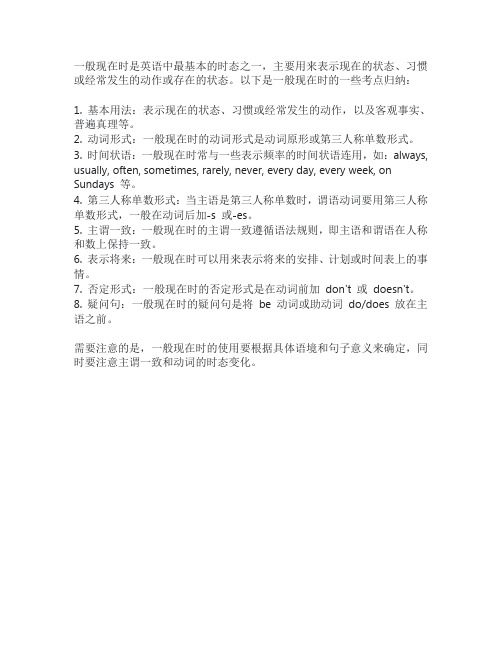
一般现在时是英语中最基本的时态之一,主要用来表示现在的状态、习惯或经常发生的动作或存在的状态。
以下是一般现在时的一些考点归纳:
1. 基本用法:表示现在的状态、习惯或经常发生的动作,以及客观事实、普遍真理等。
2. 动词形式:一般现在时的动词形式是动词原形或第三人称单数形式。
3. 时间状语:一般现在时常与一些表示频率的时间状语连用,如:always, usually, often, sometimes, rarely, never, every day, every week, on Sundays 等。
4. 第三人称单数形式:当主语是第三人称单数时,谓语动词要用第三人称单数形式,一般在动词后加-s 或-es。
5. 主谓一致:一般现在时的主谓一致遵循语法规则,即主语和谓语在人称和数上保持一致。
6. 表示将来:一般现在时可以用来表示将来的安排、计划或时间表上的事情。
7. 否定形式:一般现在时的否定形式是在动词前加don't 或doesn't。
8. 疑问句:一般现在时的疑问句是将be 动词或助动词do/does 放在主语之前。
需要注意的是,一般现在时的使用要根据具体语境和句子意义来确定,同时要注意主谓一致和动词的时态变化。
一般现在时
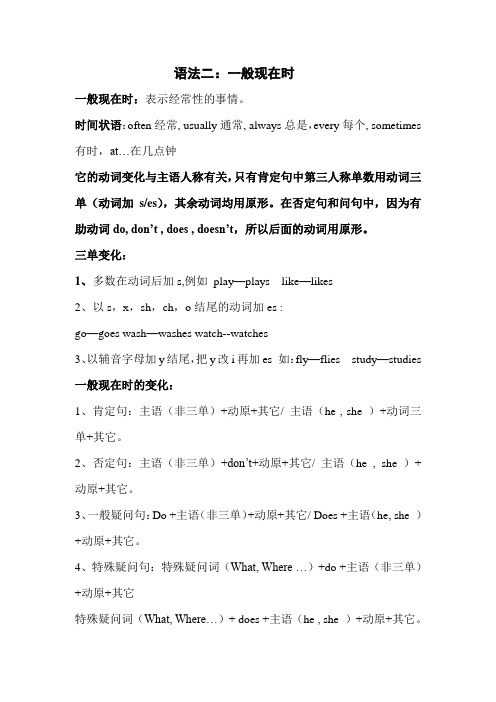
语法二:一般现在时一般现在时:表示经常性的事情。
时间状语:often经常, usually通常, always总是,every每个, sometimes 有时,at…在几点钟它的动词变化与主语人称有关,只有肯定句中第三人称单数用动词三单(动词加s/es),其余动词均用原形。
在否定句和问句中,因为有助动词do, don’t , does , doesn’t,所以后面的动词用原形。
三单变化:1、多数在动词后加s,例如play—plays like—likes2、以s,x,sh,ch,o结尾的动词加es :go—goes wash—washes watch--watches3、以辅音字母加y结尾,把y改i再加es 如:fly—flies study—studies 一般现在时的变化:1、肯定句:主语(非三单)+动原+其它/ 主语(he , she )+动词三单+其它。
2、否定句:主语(非三单)+don’t+动原+其它/ 主语(he , she )+动原+其它。
3、一般疑问句:Do +主语(非三单)+动原+其它/ Does +主语(he, she )+动原+其它。
4、特殊疑问句:特殊疑问词(What, Where …)+do +主语(非三单)+动原+其它特殊疑问词(What, Where…)+ does +主语(he , she )+动原+其它。
练习:1. We often___________(play) in the playground.2. He _________(get) up at six o’clock.3. __________you _________(brush) your teeth every morning?4. What (do) he usually (do) after school?5. Danny __________(study) English,Chinese,Maths,Science and Art at school.6. Mike sometimes __________(go) to the park with his sister.7. At eight at night, she __________(watch) TV with his parents.8. ________ Mike________(read) English every day?9. How many lessons _________your classmate________(have) on Monday?10. What time _________his mother_________(do) the housework?11. What you usually_______ (do ) on Sundays ?12. He ________( not like ) ( drink ) tea .13. They __________(not like ) __________( play ) cards.。
如何区分一般现在时

如何区分一般现在时、现在进行时、一般过去时、一般将来时、一、一般现在时:概念:经常、反复发生的动作或行为及现在的某种状况。
例:He listens to the radio every evening.时间状语:always, usually, often, sometimes, every week (day, year, month…), once a week, on Sunday, etc.基本结构:①be动词;②行为动词否定形式:①am/is/are +not;②此时态的谓语动词若为行为动词,则在其前加don't,如主语为第三人称单数,则用doesn't,同时还原行为动词。
一般疑问句:①把be动词放于句首;②用助动词do提问,如主语为第三人称单数,则用does,同时,还原行为动词。
二、一般过去时:概念:过去某个时间里发生的动作或状态;过去习惯性、经常性的动作、行为。
例:I wasborn on April 2, 1986.时间状语:ago, yesterday, the day before yesterday, last week(year, night, month…), in 1989, just now, at the age of 5, one day, once upon a time, etc.基本结构:①be动词;②行为动词否定形式:①was/were +not;②在行为动词前加didn't,同时还原行为动词。
一般疑问句:①was或were放于句首;②用助动词do的过去式did 提问,同时还原行为动词。
三、现在进行时:概念:表示现阶段或说话时正在进行的动作及行为。
时间状语:at the monment look listen\now例:The woman is talking to the doctor.时间状语:now, at this time, these days, etc.基本结构:am /is/are +doing否定形式:am /is/are +not +doing.一般疑问句:把be动词放于句首。
一般现在时的概念

一般现在时1.概念:一般现在时表示经常的、习惯性的动作或存在的状态。
2. 一般现在时的构成一般现在时的构成主要有两种形式:(1)be型:句子的谓语动词只有be(am,is或are):a.肯定句中,只出现be,如:I am a student.我是一名学生。
b.否定句中,要在be后面加not,如:She isn't a teacher.她不是教师。
c.一般疑问句,要将be放在句子开头(注意句首字母大写),句尾用问号,答语用Yes,主语+be.或No,主语+be+not.如:—Are you ready—你准备好了吗—Yes,I am.—是的,我准备好了。
(—No,I'm not.—不,我没准备好。
)(2)实义动词型:句中的谓语动词为实义动词(也叫行为动词):a.肯定句中,只出现实义动词,如:I get up in the morning.我早晨起床。
b.否定句中,要在实义动词前面加do(does)+not,do(does)作助动词,本身无意义,常与not 缩写成don't(doesn't),如:I don't like vegetables.我不喜欢蔬菜。
c.一般疑问句,要在句子开头加助动词Do(does),句尾用问号,简略答语用Yes,主语+do(does).或No,主语+do(does)+not.如:—Do you like oranges—你喜欢桔子吗—Yes,I do.—是的,我喜欢。
(—No,I don't.—不,我不喜欢。
)3.一般现在时的用法1) 经常性或习惯性的动作,常与表示频度的时间状语连用,如:every…, sometimes, at…, on Sunday等。
I leave home for school at 7 every morning. 我每天早上7点去上学。
2) 客观真理,客观存在,科学事实。
The earth moves around the sun. 地球绕着太阳。
一般现在时的讲解及用法

一般现在时的讲解及用法一、定义与讲解1,定义:一般现在时,表示经常性的事情,经常性的动作或一般性事实。
2,只有在第三人称单数用动词的“三单变化”,其他用动词的原形。
注:1)第一人称(I,we) 第二人称(you)第三人称(He,She,they,it,所有的名字名称)单数(一个人或事物)复数(两个或两个以上的人或事物)第三人称单数(第三方的单个的人或事物,除了they)2)三单变化多数在动词(不是名词)后+s eg: play — plays like — likes(1)直接在动词词尾加-s.ask---asks work---works get---gets stay---stays(2)以字母s, x, ch, sh或o结尾的动词,在词尾直接加-es.watch---watches wish---wishes fix---fixes do---doesgo---goes pass---passes(3)以“辅音字母加- y”结尾的动词,要先变y为i再加-es.(辅音字母:除a,e,i,o,u 这5个元音字母外的21个字母都是辅音字母;元音字母加-y:stay--stays play--plays say--says buy--buys辅音字母加-y:try---tries study---studies cry---cries fly---flies二、一般现在时的用法1,经常性或习惯性的动作,常与表示频度的时间状语连用。
时间状语:every day, sometimes,at…, on Sunday,usually,once a weekI leave home for school at 7 every morning.2,客观真理,客观存在,科学事实。
The earth goes around the sun.3,表示格言或警句中。
Practice makes perfect. 熟能生巧。
一般现在时
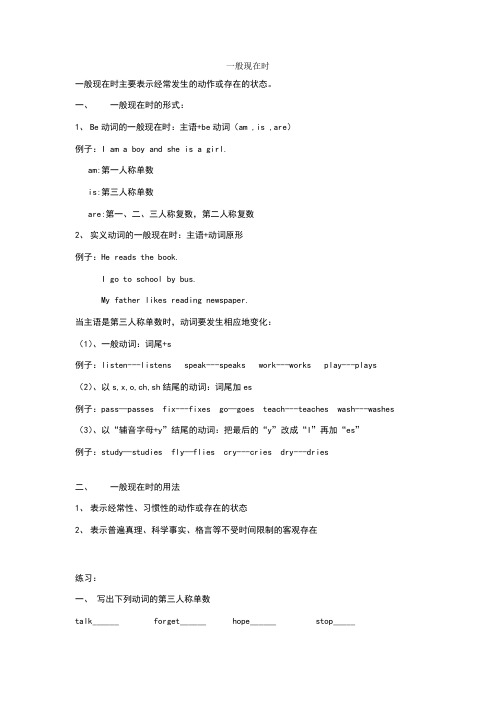
一般现在时一般现在时主要表示经常发生的动作或存在的状态。
一、一般现在时的形式:1、Be动词的一般现在时:主语+be动词(am ,is ,are)例子:I am a boy and she is a girl.am:第一人称单数is:第三人称单数are:第一、二、三人称复数,第二人称复数2、实义动词的一般现在时:主语+动词原形例子:He reads the book.I go to school by bus.My father likes reading newspaper.当主语是第三人称单数时,动词要发生相应地变化:(1)、一般动词:词尾+s例子:listen---listens speak---speaks work---works play---plays (2)、以s,x,o,ch,sh结尾的动词:词尾加es例子:pass—passes fix---fixes go—goes teach---teaches wash---washes (3)、以“辅音字母+y”结尾的动词:把最后的“y”改成“I”再加“es”例子:study—studies fly—flies cry---cries dry---dries二、一般现在时的用法1、表示经常性、习惯性的动作或存在的状态2、表示普遍真理、科学事实、格言等不受时间限制的客观存在练习:一、写出下列动词的第三人称单数talk______ forget______ hope______ stop_____perform______ play______ say______ buy______ worry______ fly______ study_______ like_______ make______ take______love_______ recite_______ become_______ come_______ drive_______ shine_______leave_____ wake_______ ride_______ write_______ hike______give______ see______ swim______ stop______ shop_______ plan______ get______ sit_______ let_______ cut_______run_______ forget_______ begin_______ wash_____ watch_______ finish______ teach_____ fish_______ reach_______ go_______ do_____二、用括号内动词的适当形式填空。
一般现在时
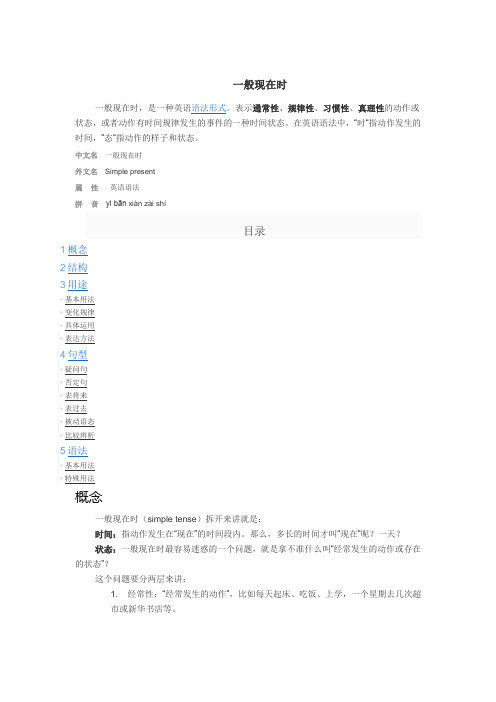
一般现在时一般现在时,是一种英语语法形式。
表示通常性、规律性、习惯性、真理性的动作或状态,或者动作有时间规律发生的事件的一种时间状态。
在英语语法中,“时“指动作发生的时间,”态“指动作的样子和状态。
中文名一般现在时外文名Simple present属性英语语法拼音yì bān xiàn zài shí目录4. 在某些以here,there开头的句子中,用一般现在时表示正在发生的动作。
一般现在时的分析具体运用1. 表示经常的或习惯性的动作,常与表示频率的时间状语连用。
时间状语:always,usually,every morning/night/evening/day/week/year,often,sometimes,occasionally,from time to time,twice a week,rarely,seldom,once a month,hardly,ever,never.e.g. I leave home for school at 7:00 every morning.我每天早上7点左右离开家去学校。
2. 描述主语的状态、性质、特征、能力等,目的是为了“描述现阶段的动作或者状态。
e.g. I don't want so much.我不想要太多。
Wang An writes good English but doesn't speak well.王安英语写得很好但是说的不好比较:Now I put the sugar in the cup.现在我把一些糖放杯子里面。
I am doing my homework now.现在我正在写我的作业。
第一句用一般现在时,用于操作演示或指导说明的示范性动作,表示言行的瞬间动作。
再如:Now watch me,I switch on the current and stand back. 第二句中的now是进行时的标志,表示正在进行的动作的客观状况,所以后句用现在进行时。
一般现在时

• 用括号内所给词的适当形式填空。 • I often___(go) to school by bike.
• Tim usually__(get) up at six o’clock.
• 实义动词是表示动作或状态的词。 • 英语动词是词类中最复杂的一种,谓语动词的人称和数 必须与主语保持一致。 • 此外,它们还有时态、语态、语气等变化。 • 在一般现在时中除第三人称单数外,谓语动词用原形。 • 主语是第三人称单数时,谓语动词要相应变化。 • 含有实义动词的一般现在时的疑问句、否定句中药借助 动词do或does
play-plays
• 一般疑问句 • Do+I/we/you/they/复数名词+动词原形+...? +he/she/it/第三人称单数名词+ +...? • 简略回答 • Yes, I/we/you/they +do. • No, I/we/you/they +don't. • Yes, he/she/it+does. • No, he/she it +doesn't. • 特殊疑问句 • 特殊疑问词(作主语)+动词的相应形式+...? • 特殊疑问词(不做主语)+do/does+主语+动词原形+...?
• 一般现在时的构成
• 系动词be 是表示主谓关系的动词,它的后面必须加 表语(通常为名词、形容词或介词短语)。
• 肯定句 • I+am+... • We/You/They/复数名词+are+... • He/She/It/第三人称单数名词+is+... • 否定句 • I+am +... • We/You/They/复数名词+are +... • He/She/It/第三人称单数名词+is +...
一般现在时详解
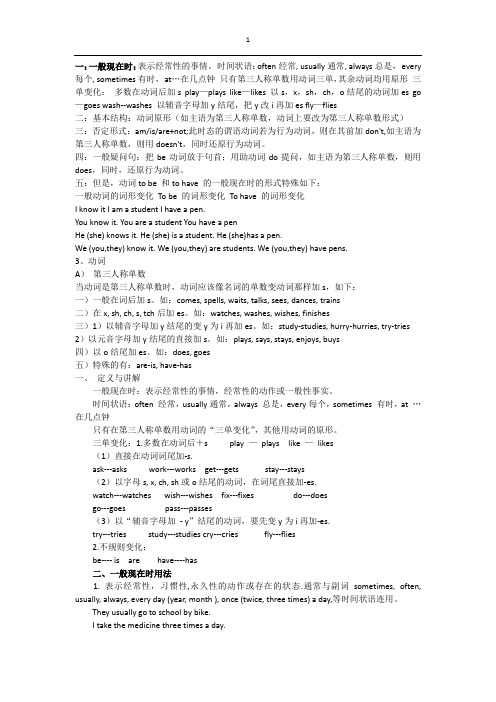
一:一般现在时:表示经常性的事情。
时间状语:often经常, usually通常, always总是,every 每个, sometimes有时,at…在几点钟只有第三人称单数用动词三单,其余动词均用原形三单变化:多数在动词后加s play—plays like—likes 以s,x,sh,ch,o结尾的动词加es go —goes wash--washes 以辅音字母加y结尾,把y改i再加es fly—flies二:基本结构:动词原形(如主语为第三人称单数,动词上要改为第三人称单数形式)三:否定形式:am/is/are+not;此时态的谓语动词若为行为动词,则在其前加don't,如主语为第三人称单数,则用doesn't,同时还原行为动词。
四:一般疑问句:把be动词放于句首;用助动词do提问,如主语为第三人称单数,则用does,同时,还原行为动词。
五:但是,动词to be 和to have 的一般现在时的形式特殊如下:一般动词的词形变化To be 的词形变化To have 的词形变化I know it I am a student I have a pen.You know it. You are a student You have a penHe (she) knows it. He (she) is a student. He (she)has a pen.We (you,they) know it. We (you,they) are students. We (you,they) have pens.3、动词A)第三人称单数当动词是第三人称单数时,动词应该像名词的单数变动词那样加s,如下:一)一般在词后加s。
如:comes, spells, waits, talks, sees, dances, trains二)在x, sh, ch, s, tch后加es。
如:watches, washes, wishes, finishes三)1)以辅音字母加y结尾的变y为i再加es。
一般现在时的用法,公式

一般现在时的用法,公式一般现在时是表示当前情况、经常性、习惯性或普遍性的动作、状态或事件的时态。
它是英语最基本、最常用的时态之一。
一般现在时的公式为:主语+动词原形(第三人称单数动词在后面加-s或-es形式)+其他。
以下是一般现在时的几种具体用法:1.表示经常性或习惯性的动作或状态:- I eat breakfast every morning.(我每天早上吃早餐。
)- She always goes to bed early.(她总是早睡。
)2.表示普遍性或事实的陈述:- The Earth revolves around the sun.(地球绕着太阳转。
)- Water boils at 100 degrees Celsius.(水在摄氏100度沸腾。
)3.表示现时的状态或情况:- I am a student.(我是个学生。
)- He works at a bank.(他在一家银行工作。
)4.表示客观事实或自然规律:- Plants need sunlight to grow.(植物需要阳光来生长。
)- The moon shines at night.(月亮在夜晚发光。
)除了以上几种常见用法外,一般现在时还可用于表示将来安排的时间表、表达祝福、谚语等等。
需要注意的是,在一般现在时中,第三人称单数形式的动词要加上-s或-es。
例如:he runs, she eats, it speaks。
同时,当主语为第一人称、第二人称或复数形式时,动词原形不变。
此外,一般现在时还可以配合一些时间状语词如always(总是)、usually(通常)、often(经常)、sometimes(有时候)等进行修饰,以表达更准确的频率性。
一般现在时
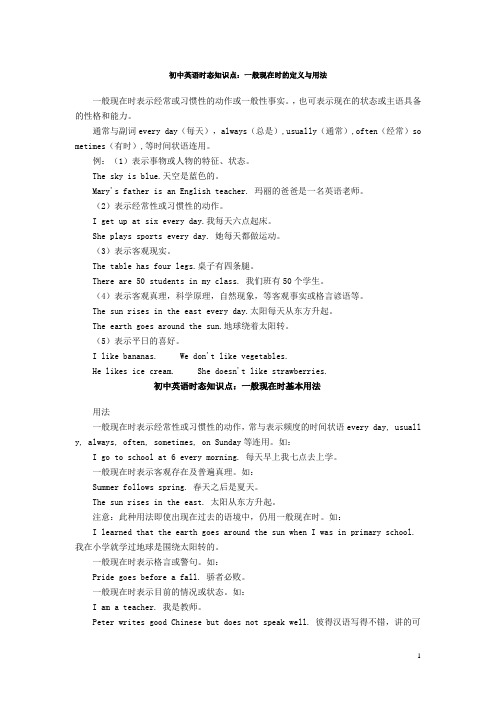
初中英语时态知识点:一般现在时的定义与用法一般现在时表示经常或习惯性的动作或一般性事实。
,也可表示现在的状态或主语具备的性格和能力。
通常与副词every day(每天),always(总是),usually(通常),often(经常)so metimes(有时),等时间状语连用。
例:(1)表示事物或人物的特征、状态。
The sky is blue.天空是蓝色的。
Mary's father is an English teacher. 玛丽的爸爸是一名英语老师。
(2)表示经常性或习惯性的动作。
I get up at six every day.我每天六点起床。
She plays sports every day. 她每天都做运动。
(3)表示客观现实。
The table has four legs.桌子有四条腿。
There are 50 students in my class. 我们班有50个学生。
(4)表示客观真理,科学原理,自然现象,等客观事实或格言谚语等。
The sun rises in the east every day.太阳每天从东方升起。
The earth goes around the sun.地球绕着太阳转。
(5)表示平日的喜好。
I like bananas. We don't like vegetables.He likes ice cream. She doesn't like strawberries.初中英语时态知识点:一般现在时基本用法用法一般现在时表示经常性或习惯性的动作,常与表示频度的时间状语every day, usuall y, always, often, sometimes, on Sunday等连用。
如:I go to school at 6 every morning. 每天早上我七点去上学。
一般现在时表示客观存在及普遍真理。
如:Summer follows spring. 春天之后是夏天。
一般现在时(一般疑问句)

特殊疑问句的语序
特殊疑问句的语序与陈述句不同,通 常是将特殊疑问词放在句首,然后是 助动词、主语和谓语,最后是其他成 分。
例如,“What do you want to eat?”这个句子的语序是“what(特 殊疑问词)+ do(助动词)+ you( 主语)+ want to eat(谓语)”。
05
CATALOGUE
一般现在时的实际应用
在日常对话中的应用
询问信息
使用一般现在时可以询问对方的基本信息,例如 姓名、年龄、职业等。
表达意见和看法
使用一般现在时可以表达自己的观点和看法,例 如对某件事情的看法或对某个人的评价。
描述当前状态
使用一般现在时可以描述当前的状态或情况,例 如身体状况、心情等。
语法填空
在语法填空中,使用一般现在时可以表示某个动作或状态是现在 发生的,或者表示某个习惯性的动作或状态。
写作
在写作考试中,使用一般现在时可以描述当前的情况或事件,表 达自己的观点和态度。
阅读理解
在阅读理解中,使用一般现在时可以描述某个事实或现象,帮助 理解文章内容。
THANKS
感谢观看
动词形式
一般现在时的动词形式比较简单 ,通常为动词原形,例如“I walk to the park every Sunday.”(每
周日我都步行去公园。)
时间限定
一般现在时表示的动作或状态与现 在时间相关,但不强调具体的时间 点,而是强调动作或状态的持续性 。
使用频率
由于其表达的信息与现实生活紧密 相关,因此一般现在时在英语口语 和书面语中都非常常用。
一般现在时(一般疑 问句)
contents
目录
一般现在时的时态结构
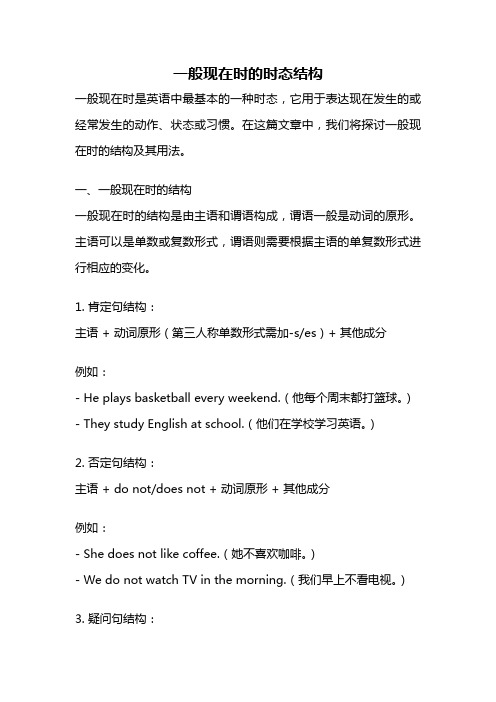
一般现在时的时态结构一般现在时是英语中最基本的一种时态,它用于表达现在发生的或经常发生的动作、状态或习惯。
在这篇文章中,我们将探讨一般现在时的结构及其用法。
一、一般现在时的结构一般现在时的结构是由主语和谓语构成,谓语一般是动词的原形。
主语可以是单数或复数形式,谓语则需要根据主语的单复数形式进行相应的变化。
1. 肯定句结构:主语 + 动词原形(第三人称单数形式需加-s/es)+ 其他成分例如:- He plays basketball every weekend.(他每个周末都打篮球。
)- They study English at school.(他们在学校学习英语。
)2. 否定句结构:主语 + do not/does not + 动词原形 + 其他成分例如:- She does not like coffee.(她不喜欢咖啡。
)- We do not watch TV in the morning.(我们早上不看电视。
)3. 疑问句结构:Do/Does + 主语 + 动词原形 + 其他成分?例如:- Do you play tennis?(你打网球吗?)- Does he speak French?(他会说法语吗?)二、一般现在时的用法1. 表示经常性的动作或习惯一般现在时常用于描述经常性的动作或习惯。
这些动作或习惯发生的频率可以是每天、每周、每月或每年等。
例如:- She drinks a cup of tea every morning.(她每天早上喝一杯茶。
)- They go to the gym twice a week.(他们每周去两次健身房。
)2. 表示客观事实或普遍真理一般现在时还可用于表达客观事实或普遍真理。
这些句子中的动词通常是不可数名词或不及物动词。
例如:- Water boils at 100 degrees Celsius.(水在100摄氏度时沸腾。
)- The sun rises in the east.(太阳从东方升起。
一般现在时

4. She lives in a small town near New York. (改为一般疑问句)
She doesn’t live in a small town Near New York. 5. I watch TV every day. (改为一般疑问句)
Do you watch TV every day?
passes (pass) the ball to Daniel. 5. Simon ______
1. She likes the black bag very much . (变为否定句)
She doesn’t like the black bag very much. 2. I buy the pants for only 50 Yuan. (用she改写句子) She buys the pants for only 50 Yuan.
We go to work by bike.
We do not go to work by bike.
don’t/ doesn’t
当主语为复数时,用助动词do构成否定 当主语为单数时,用助动词does构成否 定 注意:don’t 和 doesn’t 之后动词一定要用原形
例: 将下列各句从肯定式改为否定式
一般现在时的时间短语
1、every系列
every
day year month week morning afternoon evening
2、频率副词
never
seldom
sometimes
often
usually
always
3、次数
一次 once 两次 twice 三次 three times 一周两次 twice a week 每周四次 four times a week 每周六 on Saturdays 每周日 on Sundays
一般现在时_完整版
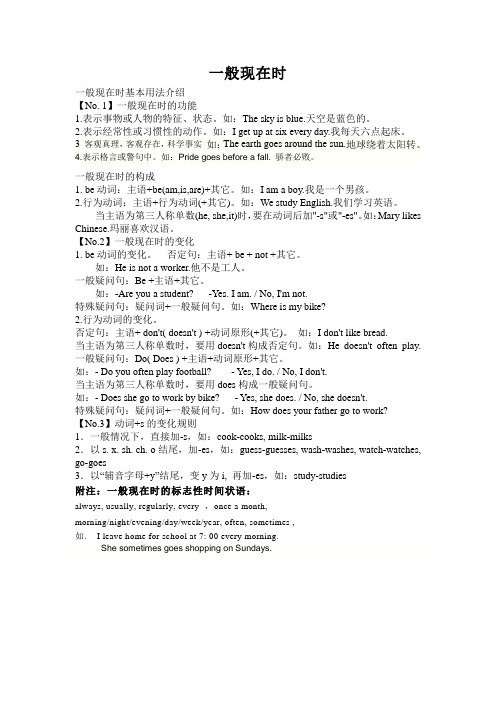
一般现在时一般现在时基本用法介绍【No. 1】一般现在时的功能1.表示事物或人物的特征、状态。
如:The sky is blue.天空是蓝色的。
2.表示经常性或习惯性的动作。
如:I get up at six every day.我每天六点起床。
3客观真理,客观存在,科学事实如:The earth goes around the sun.地球绕着太阳转。
4.表示格言或警句中。
如:Pride goes before a fall. 骄者必败。
一般现在时的构成1. be动词:主语+be(am,is,are)+其它。
如:I am a boy.我是一个男孩。
2.行为动词:主语+行为动词(+其它)。
如:We study English.我们学习英语。
当主语为第三人称单数(he, she,it)时,要在动词后加"-s"或"-es"。
如:Mary likes Chinese.玛丽喜欢汉语。
【No.2】一般现在时的变化1. be动词的变化。
否定句:主语+ be + not +其它。
如:He is not a worker.他不是工人。
一般疑问句:Be +主语+其它。
如:-Are you a student? -Yes. I am. / No, I'm not.特殊疑问句:疑问词+一般疑问句。
如:Where is my bike?2.行为动词的变化。
否定句:主语+ don't( doesn't ) +动词原形(+其它)。
如:I don't like bread.当主语为第三人称单数时,要用doesn't构成否定句。
如:He doesn't often play.一般疑问句:Do( Does ) +主语+动词原形+其它。
如:- Do you often play football? - Yes, I do. / No, I don't.当主语为第三人称单数时,要用does构成一般疑问句。
一般现在时、一般过去时、一般将来时

Ifyoucomethisafternoon,wewillhaveameeting.如果你今天下午能来,我们就开会。
【例题精讲】 例 1.——Whoisthatlady
——She’,andsheissogood.
carry→carried
重读闭音节动词且词尾只有 一个辅音字母,先双写词尾 的辅音字母,再在词尾加ed。
stop→stopped shop→shopped
过去式(be 动词)
am/is→wasare→were
ห้องสมุดไป่ตู้
(不规则变化)
do→did
(3)不规则动词的过去式和过去分词
第一组 AAA —cost——cut——hit——let—let —put——set——read—read
第二组 ABC —broke——chose——spoke—spoken
—stole——woke——forgot—forgotten —took——gave——hid—hidden —drove——wrote——rose—risen —rode——ate—eaten 第三组 ABC —knew——grew——threw—thrown —flew——showed—shown 第四组 ABB —built——burnt——meant—meant —lent——sent——spent—spent 第五组 ABB —kept——swept——slept—slept —left——felt——smelt—smelt —lost——learnt—learnt(learned—learned)
【例题精讲】
例 1.——Wheredidyougolastweekend
一般现在时
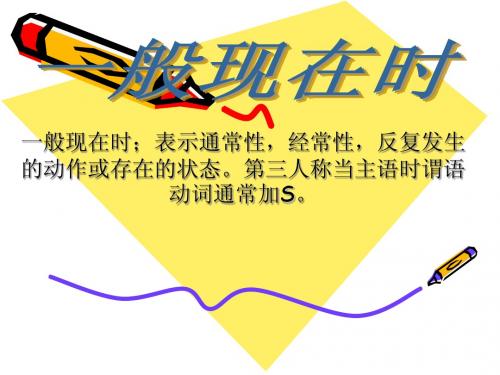
• • • •
•
• •
• • • • •
练习2 用所给动词的适当形式填空 1 ,I usually ____ (go) to school by car. 2, Mum often ____(read) some books at the weekends. 3, We sometimes ____ (have) classes in the playground. 4, Our teacher always ____(drink) tea after lunch. 5,My friends and his son often ____(study) together in the library. 6, Mary often _____(have) breakfast at six. 7, Christmas _____(come) before the New Year. 8,Miss Li ____(teach) us English. 9,It seldom _____( snow) here in winter. 10,My shoes ____(be) dirty.
4, We are beautiful. not.变成定句be后 要 • We are not beautiful. 把not添。 • Are you beautiful? • Yes, we are. No, we aren’t. 二、一般现在时实义动词结构
实义动词在一般现在时中的各种结构。 肯定句:I play football. 肯定句:She likes apples. 否定句:I don’t play football. 否定句:She doesn’t like apples. 疑问句:Do you play football? 疑问句:Does she like apples? 回答: Yes, I do. No, I don’t. 回答:Yes, she does. No, she doesn’t
- 1、下载文档前请自行甄别文档内容的完整性,平台不提供额外的编辑、内容补充、找答案等附加服务。
- 2、"仅部分预览"的文档,不可在线预览部分如存在完整性等问题,可反馈申请退款(可完整预览的文档不适用该条件!)。
- 3、如文档侵犯您的权益,请联系客服反馈,我们会尽快为您处理(人工客服工作时间:9:00-18:30)。
一般现在时练习一、写出下列动词的第三人称单数Talktalks forgetforgets hopehopes stopstops performperforms playplays saysays buybuys worryworrys(错)flyflys(错)studystudy(错)taketakes makemakes likelikes fishfishs(错)reachreach(错)gogoes dodoes teachteaches love loves comecomes shineshines drivedrivesReciterecites becomebecomes Leaveleave(错)wakewridewakewride(错)writewrites forgetforgets hikehikes givegives seesees swimswim(错)stopstops shopshops planplans getgets sitsits letlets cutcuts runruns finishfinish(错)watchwatchs (错)washwashes beginbegins二、用括号内动词的适当形式填空。
1. He often has(have) dinner at home.2. Daniel and Tommy are(be) in Class One.3. We don’t watch(not watch) TV on Monday.4. Nick doesn’t go(not go) to the zoo on Sunday.5. Do they like(like) the World Cup?6. What are(错)they often do(do) on Saturdays?7. Are(错)your parents read(read) newspapers every day?8. The girl teaches(teach) us English on Sundays.9. She and I talk(take) a walk together every evening.10. There is(be) some water in the bottle.11. Mike likes(like) cooking.12. They have(have) the same hobby.13. My aunt looks(look) after her baby carefully.14. You always do(do) your homework well.15. I am(be) ill. I’m staying in bed.16. She goes(go) to school from Monday to Friday.17. Liu Tao does(do) not like PE.18. The child often watches(watch) TV in the evening.19. Su Hai and Su Yang have(have) eight lessons this term.20. -What day is(be) it today? -It’s Saturday.21 We often play (play) in the playground.22. He gets (get) up at six o'clock.23. Are you brushes (brush) your teeth every morning? (错)24. What does(do) he usually _____(错)___ (do) after school?25. Danny studys(错)(study) English, Chinese, math, science and art at school.26. Mike sometimes goes (go) to the park with his sister.27. At eight at night, she watches (watch) TV with her parents.28. Does Mike read (read) English every day?29. How many lessons does your classmate have (have) on Monday?30.What time does his mother do (do) the housework?三、按照要求改写句子1. Daniel watches TV every evening.(改为否定句)Daniel doesn’t watch TV every evening.2. I do my homework every day.(改为一般疑问句,并作否定回答)Do you do your ho mework every day? No,I don’t.3. She likes milk.(改为一般疑问句,并作肯定回答)Does she like milk? Yes,she does.4. Amy likes playing computer games.(改为一般疑问句,并作否定回答)Does Amy like playing computer games? No,she doesn’t.5. We go to school every morning.(改为否定句) We don’t go to school every morning.6. He speaks English very well.(改为否定句) He doesn’t speak English very well.7. I like taking photos in the park.(对划线部分提问) Where are(错)you like taking photos?8. John comes from Canada.(对划线部分提问) Where is(错)John come from?9. She is always a good student.(改为一般疑问句,作否定回答)Is she always a good student? No,she isn’t.10. Simon and Daniel like going skating.(改为否定句)Simon and Daniel don’t like going skating.11. Do you often play football after school? (肯定回答) Yes,I do.12. I have many books. (改为否定句)I don’t have many books.13. Gao Shan's sister likes playing table tennis.(改为否定句)Gao Shan's sister doesn’t like playing table tennis.14. She lives in a small town near New York. (改为一般疑问句)Does she live in a small town near New York?15. I watch TV every day. (改为一般疑问句)I don’t watch TV every day.16. David has got a goal. (改为一般疑问句)Does david have got a goal?17. We have four lessons.(改为否定句)We don’t have four lessons.18. Nancy doesn't run fast. (改为肯定句)Nancy does run fast.19. My dog runs fast.否定句:My dog doesn’t runs(错)fast. 一般疑问句:Does my dog runs(错)fast?20. Mike has two letters for him.一般疑问句:Does Mike have two letters for him?否定句:Mike doesn’t have two letters for him.21. I usually play football on Friday afternoon.否定句:I don’t usually play football on Friday afternoon.一般疑问句: Do you usually play football on Friday afternoon?划线提问:What do you usually doing(错)on Friday afternoon?22. Sun Yang usually washes some clothes on Saturday.否定句: Sun Yang doesn’t usually wash some clothes on Saturday.一般疑问句: Does Sun Yang usually wash some clothes on Saturday?划线提问:What’s(错)Sun Yang usually doing (错)on Saturday?23. Mingming usually waters the flowers every day.否定句: Mingming doesn’t usually water the flowers every day.一般疑问句: Does Mingming usually water the flowers every day?划线提问:What’s Mingming usually doing every day? (错)24. Tom does his homework at home.否定句: Tom doesn’t do his homework at home.一般疑问句: Does Tom do his homework at home?划线提问:What’s Tom doing at home? (错)四、改错(划出错误的地方,将正确的写在横线上)1. Is your brother speak English? Does2. Does he likes going fishing? like3. He likes play games after class. playing4. Mr. Wu teachs us English. teaches5. She don’t do her homework on Sundays. doesn’t张弘参考答案:一、略二、 1 has 2 are 3 doesn’t watch 4 doesn’t go 5 Do like 6 do do 7 Do read8 teaches 9 take 10 is 11 likes 12 have 13 look/is looking 14 do15 am 16 goes 17 does 18 watches 19 have 20 is 21 play 22 gets 23 Do brush24 does do 25 studies 26 goes 27 watches 28 Does read 29 does have 30 does do三、略四、1 Is---Does 2 likes---like 3 play---playing 4 teachs---teaches5 don’t --- doesn’t。
